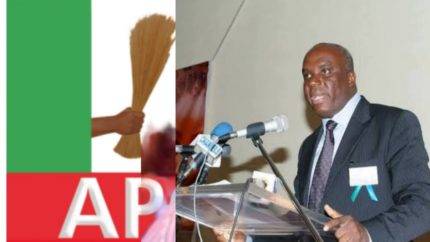The All Progressives Congress (APC) has swiftly rejected Professor Pat Utomi’s recent proposal for the formation of a mega party by major opposition parties. Utomi, a prominent political economy professor, suggested on national television that the presidential candidates of the PDP, LP, and NNPP were planning to collaborate against the APC in the 2027 elections. APC’s National Publicity Secretary, Felix Morka, dismissed Utomi’s idea as mere wishful thinking and insisted that the professor should not be taken seriously.
Morka emphasized that Utomi has a history of advocating for mega parties that never materialized, casting doubt on the feasibility of the proposed alliance. The APC’s quick response positions the party as confident in its ability to maintain its dominance and diminishes the perceived threat from the suggested coalition.
APC Challenges Pat Utomi’s Credibility
In countering Professor Pat Utomi’s proposal, APC National Publicity Secretary Felix Morka questioned Utomi’s credibility as a political commentator. Morka pointed out that Utomi had previously served as a presidential adviser but failed to bring any significant political alliance to fruition. By challenging his track record, the APC aims to undermine the professor’s authority and credibility in political matters, framing his proposal as lacking substance.
The strategic use of Morka’s statement not only dismisses the proposal but also attempts to discredit the messenger, reinforcing the APC’s position as the party with a stable and successful political history.

APC Labels Pat Utomi a Serial Promoter of Unrealized Mega Parties
APC’s National Publicity Secretary, Felix Morka, went further to label Professor Pat Utomi as a “serial promoter” of mega parties that never materialized. This strong language seeks to portray Utomi as someone whose proposals lack practicality and substance. By highlighting Utomi’s past advocacy for similar alliances that failed to materialize, the APC attempts to paint him as a perennial optimist with little grounding in political reality.
APC Asserts Confidence in Maintaining Political Dominance
The APC’s swift dismissal of Utomi’s mega party proposal serves not only to reject the idea but also to project confidence in the party’s ability to maintain its political dominance. By downplaying the significance of the proposed alliance, the APC aims to convey an image of stability and strength, reinforcing the idea that opposition efforts are futile against the ruling party.
This assertion of confidence is a strategic move to reassure APC supporters and potential voters, emphasizing the party’s continued viability as the leading political force.

APC Dissects Utomi’s Proposal as Mere News Headlines
Felix Morka, the APC National Publicity Secretary, dissected Professor Utomi’s proposal, categorizing it as destined to end as mere news headlines. This framing suggests that his announcement lacks substance and is merely a sensationalistic gesture aimed at grabbing media attention. By minimizing the proposal’s significance, the APC seeks to control the narrative surrounding the potential opposition alliance, framing it as inconsequential.
The strategic use of language aims to prevent the proposal from gaining momentum and portrays it as a fleeting headline rather than a credible political development.
APC Urges Public not to Take Pat Utomi Seriously
In the wake of Utomi’s mega party proposal, the APC takes a proactive stance by urging the public not to take Professor Utomi seriously. This messaging reinforces the party’s dismissal of the proposed alliance and attempts to shape public perception. By framing Utomi as lacking credibility, the APC aims to minimize the impact of his announcement on public opinion, presenting the proposed mega party as an unrealistic and unserious endeavor.
This strategic communication strategy aims to diminish the potential influence of Utomi’s proposal and maintain the APC’s stronghold on public trust and confidence.
Table of Contents
Discover more from OGM News NG
Subscribe to get the latest posts sent to your email.














